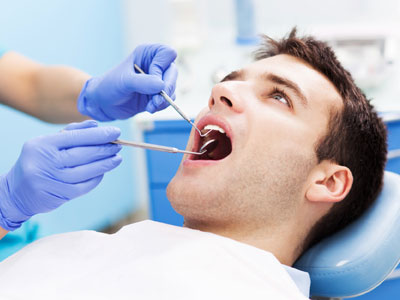

25
May
Catch Oral Cancer this Month with Your Dentist in Framingham

Many patients don’t realize that regular visits to their dentist can mean the difference between being healthy and having a deadly disease. For dentists, one of the deadliest diseases they can discover early is oral cancer. Since April is Oral Cancer Awareness Month, your dentist is taking additional steps to help patients protect themselves in between exams.
Even though your dentist in Framingham performs an oral cancer screening every time you visit, you’ll also need to remain diligent on your own. To stay two steps ahead of oral cancer, keep these signs, symptoms, and risk factors in mind.
Know the Risk Factors of Oral Cancer
Depending on your risk factors, you may need to visit your dentist more than what’s recommended by the American Dental Association. Typically, patients should visit their dentist every six months. If you have any of the following risk factors, you may need to visit more often to make sure oral cancer isn’t present. They include:
- Being older than 40 years of age
- Having HPV (human papillomavirus)
- Use of tobacco products
- Excessive alcohol use
- Prolonged exposure to UV rays (sunlight or tanning beds)
- Having a poor oral care routine or diet
Keep in mind that 25 percent of newly diagnosed oral cancer patients don’t have any high risk factors at all, so it’s always worth it to get physically examined by your dentist in Framingham. Think of it as a physical exclusively catered for the oral cavity and throat.
The Signs and Symptoms of Oral Cancer
There are many signs to look out for when catching oral cancer. While you won’t be able to diagnose yourself at home, you should still conduct monthly self-exams in front of the mirror in a well-lit room. Examine all the surfaces of your mouth, tongue, cheeks, palate, and throat for:
- Red or white patches
- Sores that bleed often or fail to heal after two weeks
- Lumps, bumps, rough spots, or thicker areas in general
You’ll also wat to tell your dentist about any soreness, hoarseness, or difficulty swallowing you experience. If you notice pain or numbness when biting down, it’s also a sign of oral cancer.
Keep in mind that oral cancer can easily mask as a non-cancerous issue (like a cold sore), so always get examined by a dentist if you notice any symptoms.
What to Expect During the Oral Cancer Screening
Oral cancer screenings are usually in two parts; the visual and physical exams.
The visual exam includes the face, neck, lips, gums, tongue, inner cheeks, tonsils, and even the nose. After removing any dental appliances, your dentist will check for any of the previously mentioned symptoms using a mirror and light. They’ll also use a tongue depressor to observe the back of the mouth. During the physical exam, your dentist will feel for unusual nodules and ask if you feel discomfort when swallowing or performing any normal movements.
Oral cancer screenings are precautionary, not necessarily diagnostic. To confirm if oral cancer is present, they’ll need to take a biopsy of the suspected area and send the sample to a lab for testing. To make sure you’re ahead of oral cancer, schedule an appointment with your dentist in Framingham today!
About the Author
Dr. Adelina Duka earned her DMD degree from the Boston University Goldman School of Dental Medicine and her DDS degree from the University of Medicine and Pharmacy “Carol Davila” Bucharest. If you believe you have symptoms of oral cancer, contact her at (508) 665-2016 or visit her website.
